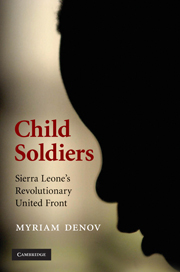Book contents
- Frontmatter
- Contents
- Acknowledgements
- Map
- Introduction: Child soldiers, iconography and the (il)logic of extremes
- 1 Children's involvement in war: The quandary of structure and agency
- 2 Recipe for rebellion: Civil war in Sierra Leone
- 3 Negotiating power: Research on and by child soldiers
- 4 ‘Becoming RUF’: The making of a child soldier
- 5 ‘Being RUF’: Victimization, participation and resistance
- 6 ‘Put dey gon don’: The unmaking of a child soldier
- 7 New battlefields
- References
- Index
5 - ‘Being RUF’: Victimization, participation and resistance
Published online by Cambridge University Press: 04 May 2010
- Frontmatter
- Contents
- Acknowledgements
- Map
- Introduction: Child soldiers, iconography and the (il)logic of extremes
- 1 Children's involvement in war: The quandary of structure and agency
- 2 Recipe for rebellion: Civil war in Sierra Leone
- 3 Negotiating power: Research on and by child soldiers
- 4 ‘Becoming RUF’: The making of a child soldier
- 5 ‘Being RUF’: Victimization, participation and resistance
- 6 ‘Put dey gon don’: The unmaking of a child soldier
- 7 New battlefields
- References
- Index
Summary
War is a total social phenomenon; violence is personal, transformative, and identity making for all involved, victims and perpetrators.
(Shepler 2003, p. 61)As time went on and the killing happened every day, we all became used to it. After some time, the violence became part of me.
(Boy)Once abducted into the RUF and the process of militarization had begun to take its course through the devices highlighted in Chapter 4, boys and girls became embroiled in a profound culture of violence. Yet how did children respond to the culture of violence that surrounded them? What did it mean to ‘be RUF’ once the process of militarization was well under way? This chapter traces children's daily lives and experiences during the heart of their time as child soldiers. It highlights the multi-faceted world that girls and boys contended with – one in which the realities of victimization, participation and resistance were experienced and carried out by children in a shifting and dialectical fashion. The chapter also explores the extent to which children took on an RUF persona, as well as responded to the RUF's culture of violence. Although caught in structures of profound violence largely beyond their control, children were not merely passive recipients to such structures but were actively implicated in, contributed to, reproduced and, ultimately, transformed the RUF.
Experiences of violence and armed conflict
While all participants were exposed to very similar circumstances and realities, children's experiences as soldiers and their reactions and responses to those experiences were neither straightforward nor uniform.
- Type
- Chapter
- Information
- Child SoldiersSierra Leone's Revolutionary United Front, pp. 121 - 144Publisher: Cambridge University PressPrint publication year: 2010



